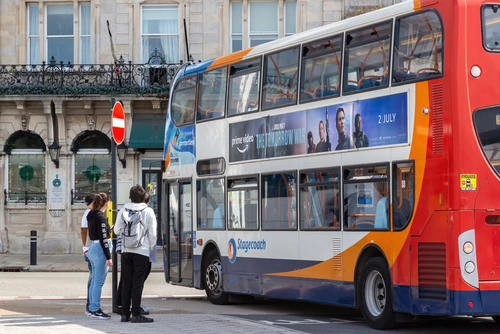
The announced bus fare cap extension is part of a £500m investment in the bus sector that aims to support people during the cost of living crisis and ensure long-term stability in the industry. The transport secretary, Mark Harper, has confirmed that £300m will be used to protect vital routes and improve services until 2025.
This investment aims to provide long-term certainty for bus users and to benefit those on lower incomes who take nearly three times as many bus trips as those on higher incomes.

Capping bus fares
The fare cap extension will be reviewed ahead of November 2024, and does not include London, after which the government will assess the effectiveness of the policy. The move is a part of the government’s Help for Households initiative to support people through the increased cost of living crisis. During the pandemic, bus usage dropped to as low as 10% of pre-pandemic levels, and while passenger levels have recovered to around 85–90%, the fare cap aims to encourage more people to use public transport to help reduce congestion and emissions.
The funding for the fare cap extension will be shared between local transport authorities and bus operators to protect and improve routes across England. The £500m investment is part of a multi-billion programme of government support for the bus sector, with the government aiming to achieve a zero-emission bus fleet as part of the National Bus Strategy.
Since February 2020, the government has supported the use of an estimated 3,400 zero-emission buses across the UK.
Prime Minister Rishi Sunak commented that the fare cap extension “helps to ease cost of living pressures”, while Harper said the investment will “level up transport in all parts of the country, doing our bit to help halve inflation and grow the economy”.
CEO of the Confederation of Passenger Transport, Graham Vidler, welcomed the two-year funding settlement, stating that it showed “a recognition of the value of buses to the economy and to local communities.” However, he noted that “the combination of the funding settlement and the £2 fare cap extension will not save every service in every part of the country.”
Local authority action
The government previously asked all English local transport authorities to set out their bus service improvement plans, with more than £1bn awarded to 34 counties, city regions, and unitary authorities to deliver service improvements, bus priority measures, and ambitious fares initiatives. Eight mayoral combined authorities have also received £5.7bn to support integrated, cross-modal transport networks over the next five years through the City Region Sustainable Transport Settlement (CRSTS), including supporting bus infrastructure.
Rebecca Fuller, Interim Director at the Urban Transport Group, responded to the announcement by stating: “The government’s decision to extend bus funding to 2025 offers a degree of longer-term certainty and brings to an end the stop-start approach that has dominated government support for the bus since the pandemic.
“However, we are yet to learn the crucial details around how local transport authority funding will be shared across the country and the extent to which this will depend on past allocations, such as Bus Service Improvement Plan (BSIP) funding.
“It seems likely that there will be winners and losers from this announcement and we are keen to ensure that our urban areas have the funding they need to not only safeguard but to also transform bus services as envisaged in the National Bus Strategy. To achieve this ambition, buses must do more than survive, they must be enabled to thrive.”
[Read more: Will going electric save UK buses?]






